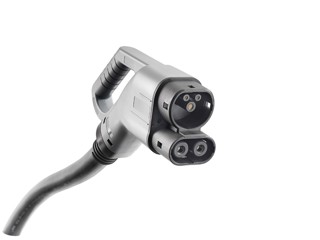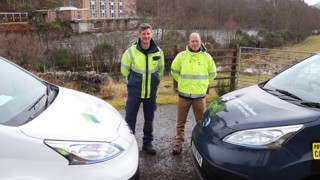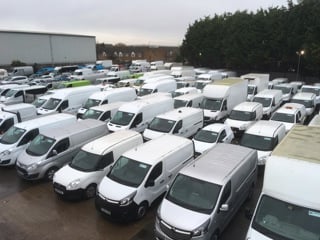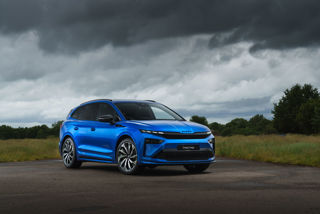Highways England hopes to fund more free electric van trials for local businesses, after launching a scheme in West Yorkshire.
Working with Leeds City Council, the operator of England’s strategic road network (SRN) has spent almost £2 million on the project, with a further £920,000 coming from the local council.
The Highways England cash has already helped to buy close to 50 electric vehicles (EVs) – 24 Nissan e-NV200s, 20 Renault Kangoo ZE Maxis and five Nissan Leafs – through the council’s existing vehicle procurement framework.
It says the money will be used to fund further EVs, with the trial fleet expected to consist of approximately 70 EVs by the end of the year.
Once the two-year scheme comes to an end, the trial EVs will join the council’s fleet, with no requirement for it to pay the original funding back to Highways England.
Christopher Plumb, air quality lead at Highways England, said: “Although this first scheme will be limited to West Yorkshire, we’re actively discussing with lots of local authorities whether we can do the same elsewhere.”
In 2015, Highways England was given £100m by Government to improve air quality between 2015 and 2021, with a directive that £75m must be spent before March 2020.
Plumb told delegates at the Energy Saving Trust Fleet Heroes conference he would like to invest more of the cash with councils.
He said: “We think this is a great way to ensure people switch to ultra-low emission vehicles.
“Discussions are ongoing and we hope to give them money before the end of this financial year.”
ACCELERATE UPTAKE
Highways England published its air quality fund plan in 2018, outlining how it wanted to improve the quality of air on the SRN, by reducing concentrations of nitrogen dioxide (NO2).
In addition, it said it wanted to help achieve wider air quality benefits, like local plans for clean air that include sections of the SRN and supporting the transition to zero-emission fleets on the roads it manages.
However, a Freedom of Information (FOI) request last November, revealed that Highways England had spent only £12.8m of the £75m designated in the air quality fund.
Plumb said: “It’s been no secret that it’s been quite challenging finding the best way to invest that pot so it will improve air quality.
“But, one great way is to accelerate the uptake of ultra-low emission vehicles (ULEVs).”
Highways England previously worked with Energy Saving Trust to identify what were the barriers to business uptake of ULEVs.
“One of the things we identified was people just wanted to try them,” said Plumb.
The highways authority first funded a six-month ‘try before you buy’ pilot project, involving 17 electric vans and five fleets across England, which ended in April 2018.
South Yorkshire Police’s facilities management and driver services teams received five Nissan e-NV200s as part of the scheme, which led to them electrifying further vehicles on the fleet. (See Fleet News, June 2019)
HELPING FLEETS
This latest initiative with Leeds City Council fits Highways England’s air quality fund objective of supporting local authorities as they deliver the Government’s air quality plan, including implementing, where required, clean air zones (CAZs).
Leeds was set to introduce a charging CAZ on January 1, but it has been delayed twice due to problems with a Government online vehicle-checking tool, which is crucial to the scheme.
The city council says it will confirm their ‘go-live’ date next month, with buses, HGVs, taxis and private hire vehicles that fail to meet the required emissions standards paying a daily fee to enter the zone.
Car and vans won’t be charged to enter the CAZ, which covers all roads within the boundary of the A61 and A63 near Leeds city centre.
However, EuroV or earlier diesel buses and coaches and HGVs will be charged £50 per day. Taxis and private hire vehicles, which are Euro5 diesel or earlier, or Euro3 petrol or earlier, will pay £12.50 per day.
In preparation for the CAZ, local businesses have been awarded more than £3.7m by the council to help them upgrade their vehicles.
New licensing data reveals that taxi and private hire operators in the city have replaced around 1,000 diesel and petrol vehicles with lower emission hybrid, electric or LPG-powered vehicles since last January.
Additionally, it has helped dozens of operators of HGVs, buses and coaches upgrade or retrofit around 170 larger vehicles.
The council has also been able to draw on its experience of operating plug-in vehicles. Councillor James Lewis, executive member with responsibility for air quality at Leeds City Council, explained: “We’ve been working over a number of years to build up our own fleet of EVs and we want to share that expertise.”
The council currently operates more than a hundred EVs and the fleet is expected to number some 300 units by April.
That knowledge, and the fact Highways England was keen to drive down emissions to within legal limits along the A61 near Leeds, were key to the development of the new EV trial for local businesses.
BUSINESS CASE
The free scheme is open to public, private and third-sector vehicle operators that currently operate at least one petrol or diesel vehicle and are based in West Yorkshire to trail an electric van. Private hire drivers are required to be licensed in Leeds.
Once an operator has registered interest in the scheme and is deemed suitable, it will have the journey profile of a petrol or diesel vehicle it operates assessed, using a telematics device, to understand whether an EV could work in theory before being loaned one under the trial.
The city council has partnered with EV specialists at Electric Blue to provide it with the telematics hardware and software to analyse data to establish the difference in ownership costs between an organisation’s existing vehicle and the trial EV.
Electric Blue has experience of conducting this type of analysis to build the business case for electrification of different fleets.
If organisations are already operating telematics in their fleet, an additional device may not have to be fitted if data can be provided in a suitable format to conduct the analysis.
Operators offered a trial vehicle for two months will be required to insure the EV, with the council providing cover for a small number of vehicles employed by small organisations.
Cllr Lewis said: “We know that changing to electric vehicles would be a leap in the dark for some so this trial is to support businesses to understand the charging regime without having to make an upfront financial commitment.”
FREE ELECTRICITY
There were more than 290 public EV charge points in West Yorkshire as of October 2019, including 141 in Leeds, 48 in Bradford, 34 in Wakefield and 19 in Calderdale.
Leeds City Council is also working in partnership with Engie and the West Yorkshire Combined Authority to install 88 new rapid charging bays across the county.
At least 30 of these new charge bays will be installed in Leeds by March 2020 and each of these chargers will be free to use until October 2021 when the scheme ends.
More than 250 businesses have already expressed their interest in the free EV trial and Cllr Lewis says if it proves really popular, and the funding is available, it may look at extending the scheme.
Cllr Lewis concluded: “We’d encourage businesses and organisations from across the region to consider taking up a free trial. EVs could help them save on running costs while reducing levels of pollution in Leeds.”






















Login to comment
Comments
No comments have been made yet.